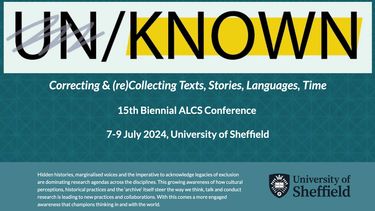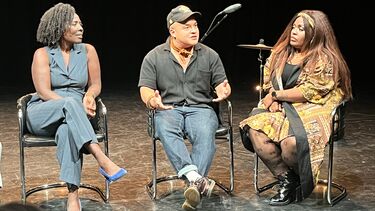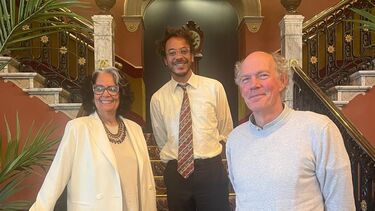Beyond the National Narrative
Our engagement with Translating Quaco has led to a successful UKRI funding application. We will collaborate with colleagues in Suriname, the UK and the Low Countries. We extend an invitation to everybody with an interest in our project to get in touch.

Our network involves academics, cultural practitioners, writers and translators to explore the present and past interconnections between the Netherlands, the UK, Suriname. We have called the project Beyond the National Narrative: Translating the Anglo-Dutch colonial legacy in restorative stories, the case of Suriname. The project runs from June 2024 till June 2026. Follow our progress below.
Activities
- July 2024: Conference Un/Known. Correcting & (re)Collecting Texts, Stories, Language, Time
- December 2024: Guest Author: Raoul de Jong
Raoul de Jong's visit to Sheffield, co-sponsored by the Netherlands Embassy in London and the Foundation for Dutch Literature was an example of where research and teaching converge meaningfully and with a clear output. De Jong (Rotterdam/Marseille/Paris) and John Eyck (New York) worked with Sheffield and UCL students on a translation of De Jong's essay Boto Banja in which he describes his boat trip in the Caribbean to connect both with his heritage and with other 'dancing authors'.
This project is part of the Beyond the National Narrative network project in which De Jong's work plays a key role. The translation was published on the website of our network partner the-low-countries.com.
- September 2025: Switi Sranan presentation Bijlmer Parktheater, Amsterdam
2025 year marks the 50th year of the Republic of Suriname. Our project straddles this date and it offers us an excellent opportunity to collaborate with cultural players such as the heritage magazine De Lage Landen. On 18 September the themed Suriname issue Switi Sranan, de culturele kracht van Suriname was presented with an evening of song, poetry, drama, and reflections. We contributed to the accompanying journal issue with a section on ‘Listening to Forgotten Voices’ with contributions by Raymi Sambo, Barbara Esseboom, Tessa Leuwsha and Henriette Louwerse.
- November 2025: Special journal issue Dutch Crossing: Republic at 50
In November 2025, the academic journal Dutch Crossing: A Journal of the Low Countries devotes a special issue to the occasion of the 50-year Republic of Suriname. Van Oostrum and Louwerse are the guest editors and contributors to this special issue entitled Republic at 50. A Surinamese Poetics of Enduring Relation. With contributions from academic, authors, and translators we want to reflect Suriname’s distinct cultural fabric woven from a multitude of traditions. We read the complex and dynamic history of Suriname as a network of cultural relations that extends beyond its ties with the Netherlands. The special issue presents a literary cultural snapshot of a Suriname from its oral histories to contemporary fiction. The contribution of the network partners are published in open access.
Henriette Louwerse, “A Bigger Story”. The Poetics of Relation in the Art and Performance of Hew Locke and Raoul de Jong. Dutch Crossing, 1–15.
Duco van Oostrum, Autobiography, Critical Fabulation, and African Voices in the Archive of Dutch Slavery: John Gabriel Stedman’s Narrative (1790; 1796) and Joachim Nettelbeck’s Ein Mann (1910). Dutch Crossing, 1–21.
- 6-14 November 2025: Network Event: Suriname
Following our inaugural meeting in Sheffield in July 2024, our second major networking event took place in Paramaribo, Suriname, from November 6–14, 2025. This intensive nine-day trip centered around an academic conference, personal meetings and historical field research.
The CARAN Conference: Knowledge Exchange
Dates: November 11–13, 2025 Location: Anton de Kom University, Paramaribo
We are profoundly grateful to the organizers of the CARAN Conference—Hilde Neus, Usha Balesar and Eric Mijts—for their hospitality. The conference generously offered us a crucial platform to present our project to experts, form new contacts, and gather fresh research ideas and materials.
The packed three-day schedule featured extensive and fascinating discussions on the unique multilingual conditions in Suriname, where Dutch serves as the official language. Our presentation, titled “Het nationale verhaal voorbij” (Beyond the National Narrative), specifically focused on the multilingual traditions of Surinamese literature and its contemporary linguistic challenges. Discussing the many facets of Surinamese narratives was highly illuminating, and we look forward to exploring future collaborations with our new (and established) contacts at the Anton de Kom University.
Historical Field Research: Plantations
After an initial exploration of the stunning Surinamese rainforest, we extended our research trip with visits to two significant historical sites:
Plantation Frederiksdorp
We traveled to Frederiksdorp by road and river, mooring as visitors have seemingly done for centuries. This former coffee plantation was founded in 1747 by Johan Friedrich Knöffel. Today, a consortium led by Sirano Zalma has transformed the plantation and village into a tourist resort and historical site, which openly explores its slavery past alongside the lives of its current inhabitants.
Duco van Oostrum reflects: “It was an odd feeling walking in this mix of old and new plantation buildings. Since the Knöffel family were historically connected to Joachim Nettelbeck and Stedman’s prints, it felt eerie to visit the place of my recent research.”
Two inspirational staff members, Altaf Gasieta and Sheyend Rampersad, led the historical tours, sharing valuable insights, knowledge, and documents, including information on the Boni tour (also a topic in Tessa Leuwsha’s recent book). Frederiksdorp also houses the impressive Rita Maasdamma Slavery Diorama, an intriguing display that uses images and text to explore life under slavery, which was highly relevant to our work on contemporary narratives.
Plantation 'Bakkie'
Following strong recommendations, Van Oostrum also visited Plantation Bakkie, once again traveling the "Suriname way"—by road and river. This former coffee plantation, founded in 1744 by Nicolaas Reynsdorp, has been repurposed as a museum by owners Bas Spek and Marsha Mormon.
The museum’s collection is remarkable, highlighting the plantation's slavery past through objects, prints, and unique original documents that were truly overwhelming. The display features:
- First editions of Stedman’s narrative
- Benoit prints
- Extremely rare Maria Sybilla Merian flora and fauna prints
- Real finds from the plantations, such as an old African flintlock, chains, and other objects denoting Bakkie’s history
Bakkie's history is vast, ranging from the discovery of another plantation site (currently subject to archaeological digs) to a WWII crashed aircraft carrying American peace negotiators. It offered a profound look into the framing of historical narratives in a deeply meaningful place.
National Radio Interview
Date: November 14, 2025 Station: Radio ABC
Before we said our goodbyes after the eye-opening whirlwind trip, we were interviewed by ABC journalist Biemla Gajadien. During the conversation for this national radio station, we emphasized the historical interconnections of Suriname, which are often obscured by a powerful orientation toward the former colonizer.
Next Stop: Amsterdam
Our next planned event is scheduled for May 2026 in Amsterdam.
- May 2026: Black Archives Amsterdam
We have a date for our final event: a network meeting in Amsterdam at the Black Archives on 26 May 2026. More info to follow soon,
Suriname
Historical Suriname was a place of imperial encounters. For centuries, Suriname was a 'contact zone', an unequal network of colonial groups , the native peoples and the enslaved black population. Only the white elite was in a position to tell the story, such as the Scottish-Dutch army captain Johan Gabriel Stedman who wrote the seminal 18th century text on the Dutch ruled plantation economy of Suriname. Stedman's writing deeply penetrated into what is now regarded as the most important historiographic and literary text of Suriname, We Slaves of Suriname by Anton de Kom. Both publications underline that colonial rule in Suriname offers a complicated, entangled story of empire that transgresses any national frame. This project brings Surinamese history and culture in a wider Caribbean and international context, high-lighting original Surinamese, Dutch, and British intersections, both historical and in today's multinational legacies.
We believe that looking beyond the current framing of imperial legacy as a national story will allow for more and diverse stories to emerge, in particular untold stories that lie buried in colonial archives and contemporary stories that engage with today's postcolonial reality. We want to propose a transnational reading and writing that acknowledges the permeable context on many levels: floating between racial groups, cultures and language, history, literature and activism.
Home affair
Debates about the history and legacy of European imperialism are the order of the day. Cities, institutions and museums, country houses, individual (royal) families: there is an appetite– or a moral demand– to investigate one's involvement with empire.
A feature of contemporary empire scrutiny is that it is often a home affair: what is the imperialist legacy of our country house, our city or our nation? In other words, the efforts are compartmentalised, directed at a domestic audience, and focused on how the national cultural memory and its representations are affected by this new consciousness around imperial heritage. Although we applaud this development, we believe this is the time to interrogate the nationally framed narratives and recognise that:
- the imperial rule drew, in practice, on a complicated, transnational European network;
- that any retelling of this ‘shared’ history should include the ignored, suppressed or absent voices of the formerly colonised.
In our academic practice we will need to add creative ways to redress, restore, repair, and move forward. For our investigation we are looking at the relatively unknown country of Suriname, north of Brazil, neighbour of former British and French Guiana. We will work in the triangle Suriname-Netherlands-UK to record, (re)tell, re-imagining and translate Suriname's colonial and postcolonial contact zone in an international language context.
Language, Imagery and Power
The connection between language, imagery and power will be explored in both creative and scholarly ways to find a fuller range of Surinamese histories. We will map the resistance and redressing of imperial inequality through existing autoethnography, informed fabulation, and the historiography of Suriname. We will work towards developing research tools, language and methods to investigate how colonial interconnections can shape restorative creative production today, in both Dutch and English. We recognise that the imagined and the creative plays a role in the exploration and redressing of historical narrative dominance and will work with artists to give shape to embedded voices which we see buried in historical accounts. The case of Suriname is particularly interesting because its national isolation is further exacerbated by the use of the Dutch language. Translation strand will facilitate a contemporary retelling of the nation of Suriname in a global context.
Principle Investigator: Henriette Louwerse
Co-investigator: Duco van Oostrum
Start date: 1 June 2024
We collaborate with: Mitchell Esajas (Black Archive Amsterdam) Tessa Leuwsha (Suriname), Tom Christiaans (the-low-countries.com)
Get in touch: h.louwerse@sheffield.ac.uk or d.oostrum@sheffield.ac.uk







